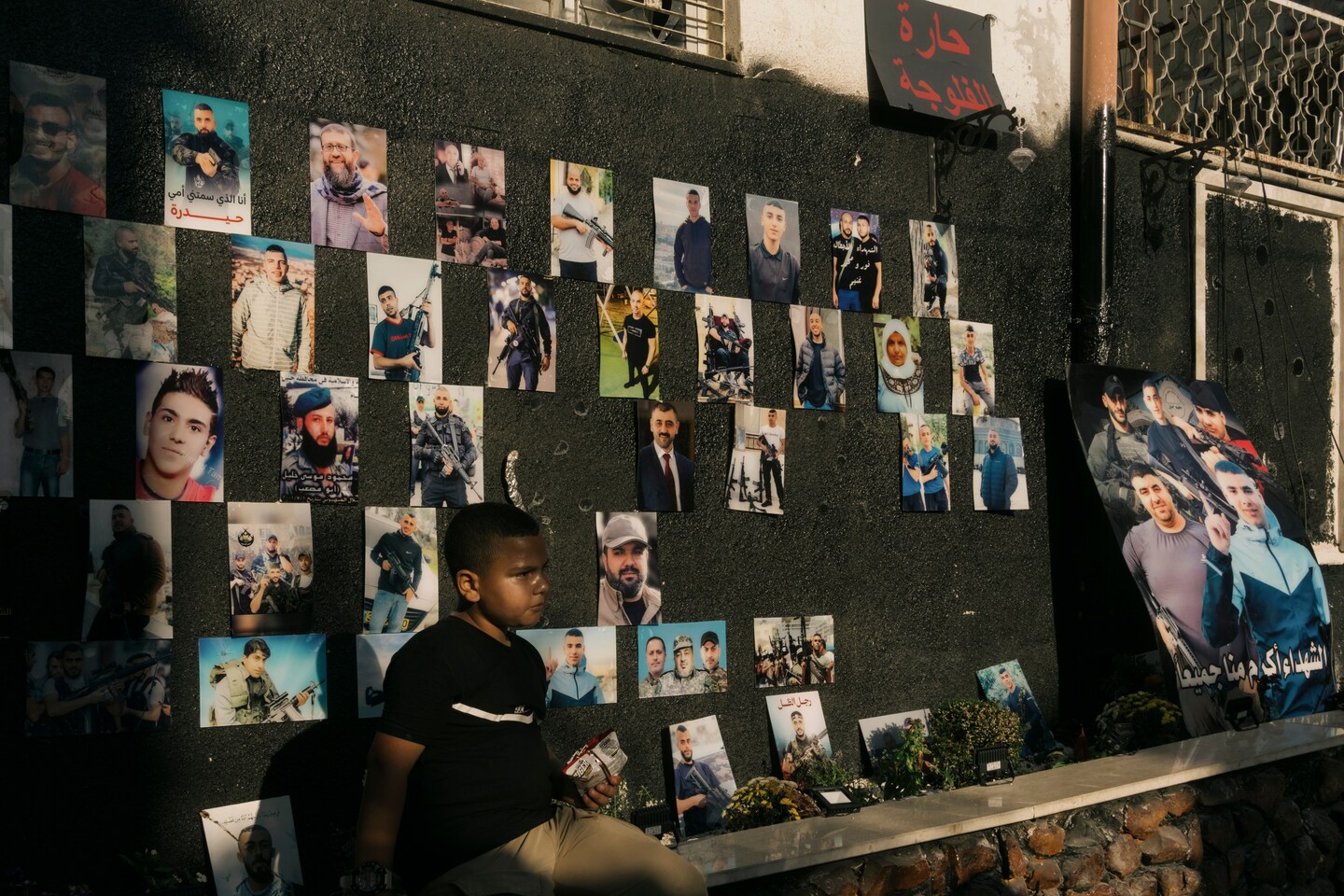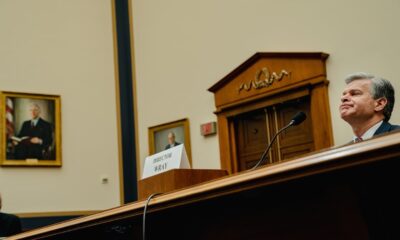English
Israeli Raid in Jenin Pushes Palestinian Authority to the Brink of Collapse

[ad_1]
[July 12, 2023 at 1:00 a.m. EDT
Images of martyrs are proudly displayed on numerous walls across the Jenin refugee camp in the West Bank. (Lorenzo Tugnoli for The Washington Post)
Comment on this story
Comment
RAMALLAH, West Bank — As hundreds of Israeli soldiers stormed into the Jenin refugee camp last week, Akram Rajoub, Jenin’s governor, was on vacation.
He hurriedly returned the following day, assembling his team of 60 Palestinian Authority security commanders: “Remain in your office; do not engage with the Israeli armed forces,” he recounted telling them.
A new generation of Palestinian fighters is emerging in the West Bank
He feared a confrontation between his men and Israeli soldiers could make the Palestinian Authority a military target and further erode its influence in the Jenin camp, which has deteriorated into lawlessness over the past several years — ruled by drug dealers and gun runners, and more recently, by loosely organized Palestinian militias that have taken up arms against Israel.
“Israel desires to dismantle the PA,” stated Rajoub, speaking in Ramallah, where he resides, 60 miles from the city he is responsible for governing. It is just one indicator of the growing separation between Palestinians and their leaders.
The Israeli operation in Jenin — the largest in the West Bank in two decades — resulted in the deaths of 12 Palestinians and one Israeli soldier, and, Israeli politicians boasted, depleted the weapons stockpiles of new militant groups. However, it also exposed the weakness of the Palestinian Authority, which Israel relies on to maintain order across the occupied territory.
For Palestinians, the authority’s decision to avoid the 44-hour battle that displaced thousands of residents and reduced much of the refugee camp to rubble has raised questions about the purpose of their government, established in 1993 to fulfill the aspiration for statehood. Thirty years later, under Israel’s most far-right government in history, many Palestinians perceive the institution as irrelevant to their lives, if not openly hostile to their cause.
‘Why did this happen?’: Israel’s raid on Jenin, through the eyes of one family
“The PA has never been weaker,” stated Diana Buttu, a lawyer who advised the Palestinian negotiating team during the second intifada, from 2000 to 2005.
She argued that Israel undermines the effectiveness of the Palestinian Authority by depriving it of resources, including the confiscation of tens of millions of dollars in monthly tax revenue. However, she also believes that Mahmoud Abbas — the aging and deeply unpopular Palestinian president who has prolonged his mandate from four years to two decades — has failed to adapt to a new reality.
“It’s as if Abu Mazen is stuck in the 1990s; it’s a joke,” Buttu remarked, using Abbas’s Arabic nickname. “The only people still talking about the two-state solution are Abu Mazen and the international community. Israel has moved on.”
With U.S.-led peace talks stalled, Israeli settlements expanding across the West Bank, and violent settlers intensifying their attacks on Palestinian communities, Abbas continues to speak of an independent Palestinian state coexisting alongside Israel.
But key members of Israel’s ruling coalition, which includes settler activists, religious conservatives, and Jewish supremacists, reject the idea of a Palestinian state.
Far-right Finance Minister Bezalel Smotrich, who holds a special role in the Defense Ministry, called earlier this year for a Palestinian village to be “wiped out” by the Israeli army. Israeli Prime Minister Benjamin Netanyahu allegedly said during a closed cabinet meeting last month that ambitions for Palestinian statehood needed to be “crushed,” according to Israeli media reports.
President Biden, in an interview with CNN on Sunday, referred to Israel’s government as “one of the most extreme cabinets” in decades. He claimed that the Palestinian Authority has “lost its credibility,” leaving “a vacuum for extremism among Palestinians.”
As the authority withdraws from asserting its jurisdiction in the northern West Bank, Palestinian militant groups are filling the void, according to Toufic Haddad, a Palestinian analyst.
“The PA feels that they are no longer ready to play the role of the local police force, especially under this government, which is transitioning into an unapologetic, supremacist apartheid,” Haddad said.
Rajoub, the governor of Jenin, insisted that Israeli raids make his job more challenging. However, he rejects the notion that it is his responsibility to rein in militant groups: “I am engaged in security work that benefits us, the Palestinian people,” he said. “I am not interested in benefiting Israel.”
With the Palestinian Authority unwilling to confront militants in their midst, Israeli military incursions have become more frequent and deadly. Each cycle of violence deepens the political stagnation, analysts say.
Israeli agents conducted raid against militants in civilian area, killing a child
“Israel’s entry into Jenin will only provide a temporary solution,” said Michael Milstein, a former senior adviser to COGAT, the Israeli agency for Palestinian civil affairs.
He claimed that the Israeli military achieved tactical victories following the Jenin raid. However, the public risks losing sight of the larger picture — that the “no man’s land” of the West Bank is increasingly resembling Gaza, and this will further entangle Israel.
According to Milstein, Israelis fail to recognize that “there are significant strategic issues that are not being addressed by this fractured coalition.”
On Sunday, the Israeli security cabinet voted to “prevent the collapse of the Palestinian Authority,” though it did not provide specific actions. A similar announcement made after regional talks in Aqaba, Jordan, in February also had no official follow-up.
Far-right National Security Minister Itamar Ben Gvir, who voted against the measure, claimed that “there is nothing more absurd than a body that encourages terrorism, pays salaries to terrorists, incites the murder of Jews, and seizes territory in the West Bank, receiving rewards in the midst of a wave of terrorism.”
Maj. Gen. Talal Dweikat, the spokesperson for the Palestinian Authority’s security services and a former governor of Jenin, laughed when asked about the Israeli cabinet’s vote to bolster the authority, calling it a “manipulation and a lie.”
“Israel’s goal is to escape the commitments it made during peace negotiations for a Palestinian state and to extort concessions from the PA,” he stated.
Abbas has announced that he will visit Jenin on Wednesday, marking his first public appearance there since the last Palestinian election campaign in 2005.
One thousand soldiers from the president’s special guard arrived on Tuesday to secure the city and the camp for his visit, according to Rajoub.
Abbas will arrive in a community that is still seething. Last week, two Palestinian Authority officials were chased away from funerals for some of the 12 men killed in the Israeli raid. “Get out! Get out!” mourners shouted. Later that day, the authority’s security forces used tear gas on a group of protesters who were throwing stones at its security headquarters.
In Jenin, and throughout the West Bank, Palestinians express fear for their safety. Last month, hundreds of armed settlers set fire to homes in Turmus Ayya, near Ramallah, following a similar rampage several months prior.
“The people were looking at us and wondering why we did not intervene, though they know the reason — because we are not allowed to exchange fire with Israeli forces, which would result in casualties on their side and ours,” stated a Palestinian security official, speaking anonymously to discuss the sensitive situation. He revealed that he had a cousin in Turmus Ayya who pleaded with him and his colleagues to come protect them.
He described his forces as “first responders,” but admitted that they primarily dealt with resolving family disputes or suppressing demonstrations against the Palestinian Authority or in support of Hamas, the rival group that governs Gaza.
While Palestinian factions engage in infighting and Israel threatens further military action, militant groups continue to grow stronger.
Mustafa Sheta, who manages a youth theater in the Jenin refugee camp, claimed that young Palestinians, who have never experienced peace negotiations or elections, believe that violence will bring them “dignity.”
“This is a generation that has not achieved even the bare minimum of realizing their dreams,” he said. “They are fighters who do not speak about liberating Palestine. They are indifferent to what Hamas, Islamic Jihad, the Palestinian Authority, or Israel have to say. They simply want resistance.”
Mohammed Najib in Ramallah and Hazem Balousha in Gaza City contributed to this report.
Gift this article
Gift Article
[ad_2]





